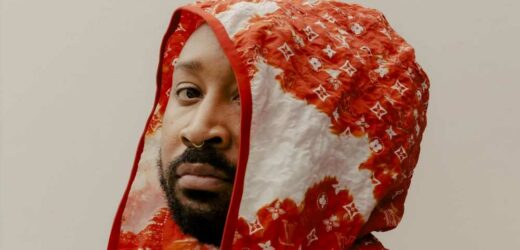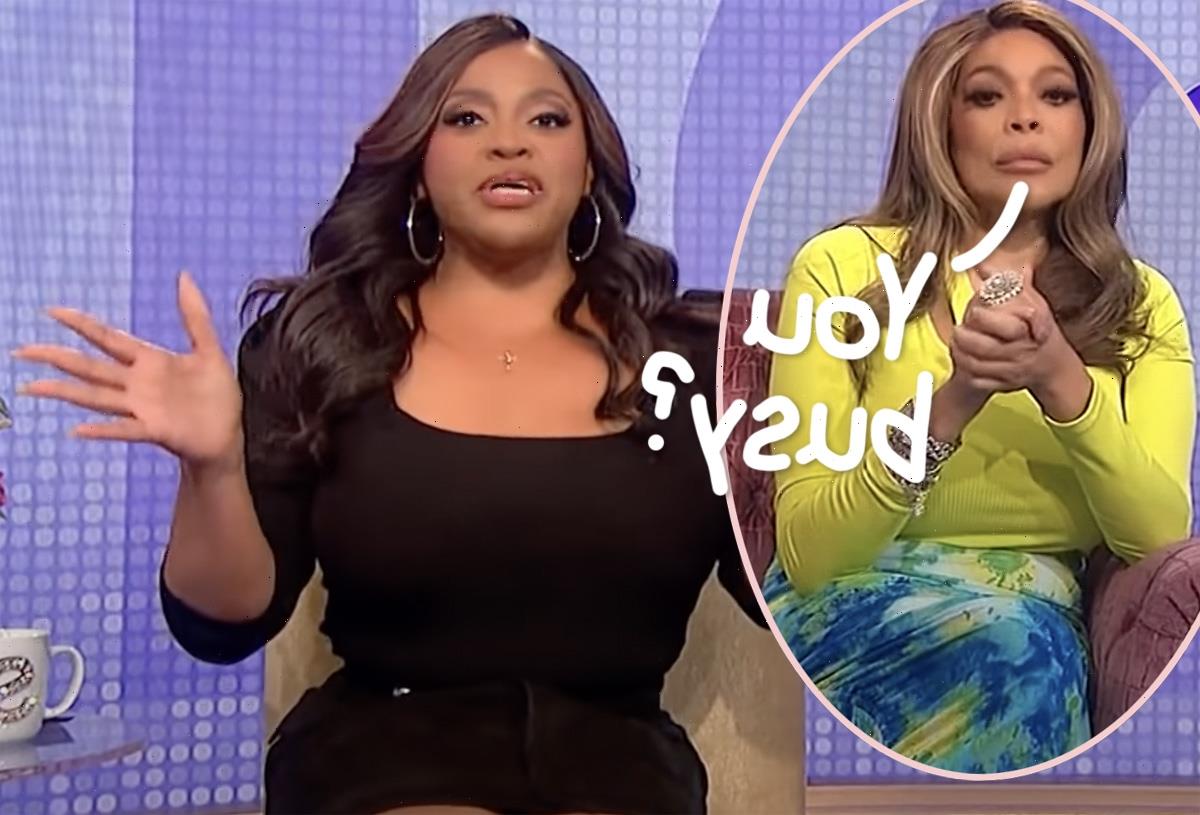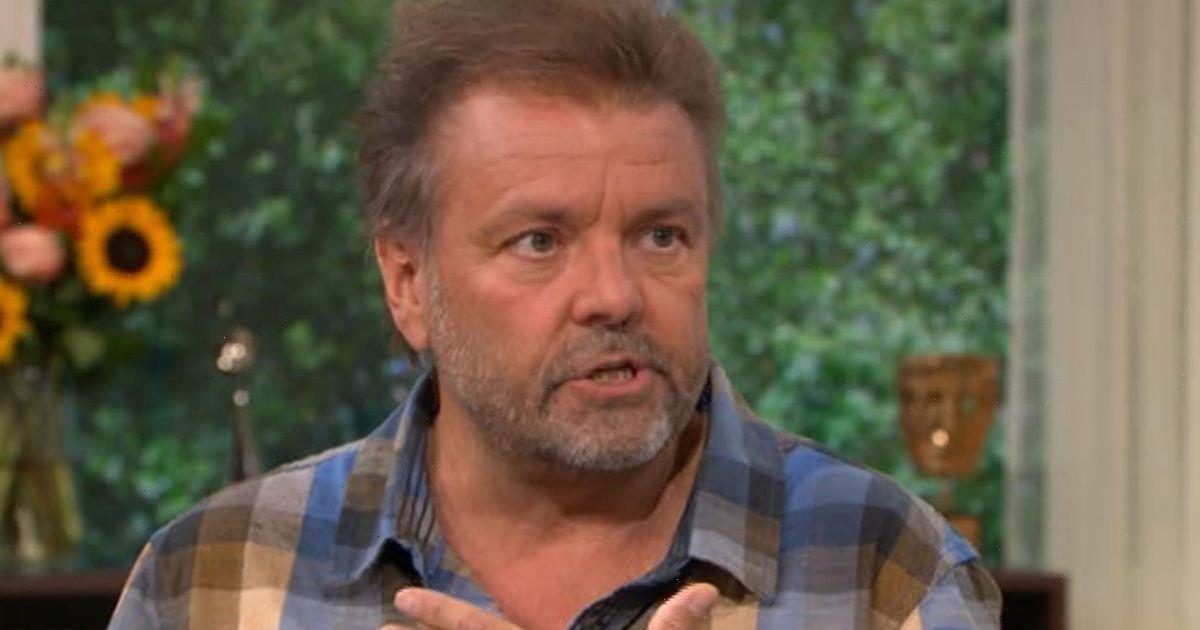Bartees Strange needs a new hobby. Back when he wasn’t playing football in high school, studying communications in college, or working a nine-to-five at the FCC, he devoted every free hour to music. Now, his only job is writing, recording, and performing songs that defy the gravity of genre to scale some of the highest ambitions on the planet — and that leaves him with time to kill.
He’s thinking of taking up rock climbing.
“I’ve been watching all the documentaries,” Strange, 33, says between spoonfuls of pho on a gray late-March afternoon in Brooklyn. He’s never actually been rock climbing, he’s quick to add: “I’m horrified of heights, which is probably why I want to do it.”
Whatever Strange wants to do, odds are he’ll pull it off. That doggedness is a big part of what has made him, in just two short years, one of the most riveting voices in rock and beyond. He announced himself in March 2020 with Say Goodbye to Pretty Boy, less a covers EP than a wholesale reimagining of five songs by the National, one of his favorite bands. Seven months later, in the thick of the pandemic, he released his debut album, Live Forever. It was pop punk, indie rock, hip-hop, emo; it was R&B, psych-noise, deep house, country. It was all of this, seamlessly distributed across 11 tracks, and sometimes packed into one perfect song, like the instant stunner “Boomer.”
Jamie Coletta, Strange’s co-manager, remembers hearing Live Forever for the first time in 2019: “At first, frankly, I was scared of it. As someone in the music business, you’re always looking for something like this… It was like hearing the future.”
Live Forever was a fixture on critics’ lists in 2020, and it put Strange at the center of a bidding war that eventually landed him a deal with 4AD, the venerable U.K. label that will release Strange’s second album, Farm to Table, on June 17.

Bartees Strange wrote some of the key songs for his new album at the same London flat where TV on the Radio once worked
Daniel Dorsa for Rolling Stone. styling by Marissa Pelly. Top and bottom by Angel Chen. Shoes by Dr. Martens. Jewelry by Bernard James.
The new album came as a surprise to Strange, who was working on an entirely different LP when this one sprang into being last fall. It was a time of big change: opening for Phoebe Bridgers and Lucy Dacus, upgrading his Ford Transit to a roomier ride, flying out to London to record at 4AD’s studio, thinking about the where-are-you-going, where-have-you-been whirlwind of his life.
Fifteen years earlier, in 2006, a young Bartees Cox Jr. had channel surfed into TV on the Radio’s Tunde Adebimpe howling “Wolf Like Me” on Letterman — a crystallizing moment that gave a Black kid in the largely white town of Mustang, Oklahoma, the first real glimpse of the kind of music he wanted to make. Now, he was literally sleeping in the same London flat where TV on the Radio did some early work on their David Bowie-featuring song “Province.” He looked around, took it all in, and thought “Damn, I’ve got a shot here.”
“I used to be on a farm, but now I’m at the table,” Strange says. “This is a new world. But I feel ready for it, and I feel like I’m bringing something that’s uniquely me.”
The track “Cosigns,” which he wrote on that London trip in 2021, serves as a thesis statement for the album, and it’s in no way hyperbole when Strange says, “I’m the only person who can write that song.” It’s a wildly energetic rap-rock hype-up anthem in which Strange spits witty bars about his tours with Bridgers, Dacus, and Courtney Barnett; boasts about FaceTime calls with Bon Iver’s Justin Vernon; quips, “I’m-a thief when things get big/Look, I’m-a steal your fans”; and casually tosses off what may well be the only big-up to Beggars Group’s 72-year-old founder, Martin Mills, in recorded music history: “I’m with Martin in the mill, we grinding, making bread.”
(While Mills was unable to provide comment, Strange says the Beggars boss would often hang in the studio and watch him work in London. When he heard “Cosigns,” Strange recalls, “He was so chill about it. His eyes kind of perked: ‘I don’t know if I’ve ever been mentioned in a song before.’ And I was like, ‘Well, thanks for signing me.’”)
“Cosigns” is the rare song that can stop you cold and also crack you up. It transcends itself halfway through, as the beat quickens, the woozy guitar loops unsnarl into roars, and Strange bellows a refrain he first wrote in a poem in his early twenties: “How to be full, it’s the hardest to know/I keep consuming, I can’t give it up/Hungry as ever, it’s never enough, it’s never enough, it’s never enough.”
Those lines express something very real about Strange. “As I get close to achieving things that I’ve wanted for a long time, I feel my appetite growing with it … I talk to my therapist about that a lot,” he says with a laugh. “I feel like I’m going to run myself into the ground if I keep raising the bar for myself. But that’s how I am. I love that shit. I like doing things that are hard to achieve. And the bar keeps going up.”
The day Live Forever came out in 2020, Strange was in Maine making music with his friends. For all his confidence, he was anxious about how the record would be received. But he also really wanted to cut some demos at that exact moment. Everything, he accurately intuited, was about to change.
“We all had this feeling of, like, ‘OK, this is real. We might pull some shit off. Let’s remember what this feels like,’” Strange recalls.
“Cosigns” notwithstanding, Strange is too restless and perceptive to simply run a victory lap. He’s thought a lot about the fact that the career breakthrough he’s been working toward for years has coincided with incredible upheaval and pain in the world. He wrote “Hold the Line,” a devastating country-soul ballad, after watching George Floyd’s daughter give TV interviews about her father’s murder. On “Escape This Circus,” he nods to Gil Scott-Heron’s “Whitey on the Moon,” while pondering the space expeditions of bored billionaires. And on “Mulholland Dr,” Strange sizes up the blissed-out, moneyed characters he encountered during a surreal stay in L.A., where he witnessed “so much power that you could do anything with it, except help anyone.”
Strange knows that power imbalance well. After leaving college in 2012, he moved from Oklahoma to Washington, D.C., drawn in part by his love for local legends like Bad Brains and Fugazi. He’d secured an internship, and as he packed up his car, he assured his parents he had a place to stay, too. He then spent two days trying to actually find one. The spot he ended up with was a backyard shed with no water and dirt floors; after running into problems with his landlords, he bailed and spent a couple of months unhoused, showering at the YMCA and sleeping in his car outside the metro station where he commuted to work.
Strange eventually befriended a Howard University student who let him crash at her dorm. To pull this off, Strange pretended to be a student, always making sure to enter the dorm at the same time as his friend, and slipping some treats to the guards at the door for good measure. He attended events on campus, hobnobbed with students and professors, sold everyone on the idea that he belonged there. Within a few months, he found a job that paid well enough for him to move out; a couple of more years, and he was working at the FCC as a deputy press secretary during the Obama administration.
“D.C.’s weird,” Strange says, laughing at the understatement as he recalls playing hardcore shows at night before going to work on the Hill in the morning. “I mean, arguably there’s no more powerful city in the world, and the issues are so outsized — and that feeds into the music.”
Strange views crisis and injustice, like so much else, with a sanguine tenacity. Not even several years working for nonprofits in the climate movement could saddle Strange with despair. Instead, he came away more devoted than ever to optimism, “even though it’s really fucking hard.”
He’s especially shrewd on “Mulholland Dr.,” a song sung from the perspective of someone so sun-drunk and well-off that their response to drought, fire, and famine is a placid “Yeah.” “I don’t believe in the bullshit of wondering when we die,” Strange sings serenely. Cutting as that might sound, it’s essentially the sentiment he himself holds, with a key distinction.
“We need to take a lot more responsibility for the impact we have on each other and on the planet,” he says. “I can’t be around people who feel like things are out of their control. Because I don’t feel like that in my life.”
Like his debut, Farm to Table is a communal effort that draws on Strange’s deep network of musical friends. Pretty much everyone comes from the community he found in Crown Heights, Brooklyn, where he moved around 2015, frustrated with his professional life and determined to take a proper stab at music. Around the same time, he took his stage name for a short-lived band called Bartees & the Strange Fruit. (After a few years in New York, he moved back to the D.C. area, where he currently lives.)
The way Strange and his current bandmates tell it backstage before their second of three shows with Car Seat Headrest in Brooklyn, they all met at the can’t-miss parties hosted by Taja Cheek, the experimental artist who performs as L’Rain. “There should be a documentary called Taja’s House,” Strange jokes. “It was all these Black and brown artists who were top quality. I saw them, and I had new heroes — like, I want to command a stage like that, I want to play like that, I want that grace. It pushed me to be myself, because everyone there was so different than the next person.”
Farm to Table, like its predecessor, demonstrates Strange’s ability to blend a stunning array of influences into something coherent and new. It can be easy for critics to fixate on the genre-busting nature of his music — but really, friends say, that’s more like a core feature of his artistry than the sum of its parts. “It’s a given,” is how Cheek puts it. “Bartees has so many different interests, and he’s done lots of things in his life. Of course his music would be a reflection of that.”
Chris Connors, another friend from those days and a close collaborator who worked as an engineer and co-producer on Farm to Table, remembers Strange’s “joy of exploration” at their London sessions. “He was on the ground, we were running some vocals, and he’s so into it,” Connors says. “He’s so happy, twisting the knobs and getting these cool sounds. It was so playful and natural and pure.”
The song Strange was working on then was “Black Gold,” a song that he says he’d been trying to write for a while. It’s a classic “I’m leaving home song,” a theme he’d explored before, though this iteration needed more time, clarity, and maturity. With a vibe that’s something like a folked-out Big Red Machine via Frank Ocean, Strange reflects on hightailing it out of Oklahoma the first chance he got: “I was way too rough with how I left my town,” he sings. “Now it’s big city lights for a country mouse.” There’s grace and reverence, acknowledging that while he left home and found his dreams elsewhere, the farm is still with him at the table. Hell, the way he tells it, it sounds practically Biblical.
“There are so many stories in the Bible about leaving home, going somewhere new, ascending, remembering where you came from, returning home a different person — literally the prodigal son,” Strange says. “All these romantic, beautiful stories.”
On the bridge to “Black Gold,” Strange flattens the distance between past and present: Everything drops out except his acoustic guitar, and then a chorus of warm, cheerful voices appears — recordings he’s made of his family singing over the years.
Growing up, that family was close, devout, and itinerant. His father was an engineer in the military, his mother an opera singer, and they bounced around Europe in his early childhood before settling in the Great Plains. On “Tours,” Farm to Table‘s remarkable acoustic centerpiece, he reflects on the loneliness and frustration he felt when his parents left for long stretches, especially his dad, who was sometimes dispatched to active combat zones. (“Where is Kuwait, is that in the States?” goes one line.)
“Tours” isn’t meant to be a guilt trip; more like a recognition of a truth about himself. “They did it for us, and they did it for them, too, because they loved it. And I’m about to do what I love,” Strange says, thinking of his own life on the road and what that might mean for any future family. “I want my kid to see me doing things that I love, so they do what they love.”
With a sigh, he admits he hasn’t played “Tours” for his parents yet. “I think so highly of them, but I know when they hear it, they’ll feel bad. But it’s like, ‘Actually, it’s OK. I’m about to do it, too.’”
Backstage in Brooklyn, Strange gives his band a pep talk. “But, yeah, man, you know, it’s just rock & roll,” he ad-libs with a goofy grin. “We’re just rock & roll kids playing rock & roll, jazz, hoochie-koo for years now.”

Onstage in Brooklyn, 2022, opening for Car Seat Headrest.
Sacha Lecca for Rolling Stone
So far, Strange has toured mostly as an opener. “Opening is a trip,” he continues. “Sometimes the sound guy gives a shit about you. Sometimes they don’t give a fuck and you get what you get, and you gotta prove it to people despite it all.”
He doesn’t mind that kind of challenge. In fact, he relishes it. “What I do is different,” he adds a few weeks later over the phone. “Oftentimes I’m the only person in the room that looks like me, and I’m throwing a lot at people, between the rap stuff, the country stuff, and the rock stuff… Even before all of this happened, any time I played a show, I’d go into it like, ‘I’m going to show you something new today.’”
The foundation Strange has built for himself feels sturdy enough to support his endless ambition. For him, it’s as much about securing his own dream of a long, sustainable, healthy career in music as it is about ensuring the same possibility for other Black and brown artists in indie rock — a genre that remains overwhelmingly white, from audience to label to media.
“Someone the other day on Instagram called me a token for only playing with white bands,” he says. “And I was like, ‘I’m doing this so that you can be here.’ I might be the only one today, but who are you going to tour with in two years? Hopefully me! I’m obviously not the first Black person to do this, and there’s a lot of other Black people in the space, but it’s interesting, grappling with that feeling. Either way, I’m trying to create space for more people who look like me.”
Strange thrives on competition, delights in challenge and skepticism. He sees the world as something to be explored, and molded, and changed. It’s an instinct that’s been with him his whole life.
“My dad always said, ‘I am God,’” he remembers. “And we’d always make fun of him, but what he was saying was: You make choices, and you have the opportunity to make them good or bad. And if you make enough things happen, you create gravity, and things will revolve around you in a way that didn’t before. I’m feeling gravity turn in a new way in my life.”
He continues: “I don’t go to church anymore or anything like that, but I still have this spiritual connection to a higher power. I feel it in my music. Or I’ll look in the crowd and just be like, ‘Man, this feels bigger than me.’ Whatever this feeling is, it’s so real, and we’re all experiencing it together. Maybe that’s God.”
Source: Read Full Article


